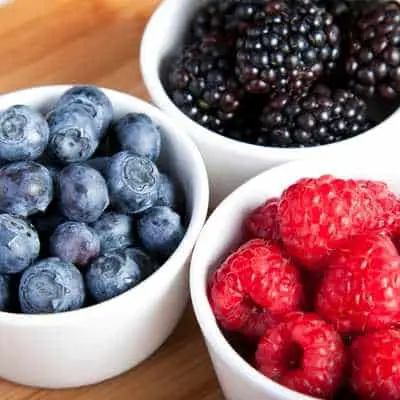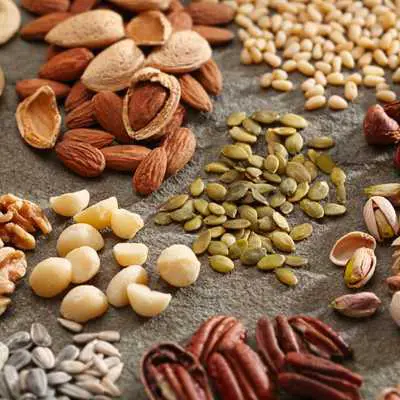As you age, it’s important to pay attention to your nutrition to support overall health and well-being. Here are 11 foods that may be worth adding to your diet if you are over 50:

11 Foods to Add to Your Diet for Over 50
Leafy Green Vegetables
Leafy green vegetables are considered to be some of the most nutritious foods you can eat. They are rich in a variety of nutrients including:
Vitamins
Leafy greens are an excellent source of vitamins, particularly vitamins K, A, and C. Vitamin K is important for maintaining healthy bones, while vitamin A is important for vision and immune function. Vitamin C is a powerful antioxidant that helps to protect cells from damage.
Minerals
Leafy greens are also a good source of minerals, including calcium, iron, and potassium. Calcium is important for maintaining strong bones, while iron is essential for carrying oxygen to the body’s cells. Potassium is important for maintaining normal blood pressure and heart function.
Fiber
Leafy greens are high in fiber, which can support digestion and help to prevent constipation.
Antioxidants
Some leafy greens, such as spinach and kale, are high in antioxidants, which are substances that can help protect cells from damage caused by free radicals.
Low in calories
Leafy greens are low in calories, making them a good choice for people trying to maintain a healthy weight.
Some common types of leafy greens include kale, spinach, broccoli, collard greens, and lettuce.

Berries
Berries are high in nutrients and low in calories. They are considered to be “super foods” and have many potential health benefits including :
High in antioxidants
Berries are high in antioxidants, which are substances that can help to protect cells from damage caused by free radicals. Antioxidants may help to reduce the risk of chronic diseases like heart disease and cancer.
High in fiber
Berries are high in fiber, which supports digestion and helps to prevent constipation.
Low in calories
Berries are generally low in calories, making them a good choice for people trying to maintain a healthy weight.
May improve heart health
Some studies have suggested that consuming berries may help to reduce the risk of heart disease by lowering blood pressure and cholesterol levels.
May improve brain function
Some research has suggested that consuming berries can reduce the risk of cognitive decline and support brain function.
Some common types of berries include strawberries, blueberries, raspberries, and blackberries.

Whole grains
Whole grains are plant seeds that contain all three parts of the grain – the bran, germ, and endosperm.
They are considered to be more nutritious than refined grains, which have had the bran and germ removed during processing.
Here are some potential health benefits of consuming whole grains:
High in fiber
Whole grains are high in fiber, which can help support digestion and prevent constipation.
Reduces the risk of heart disease
Some research has suggested that consuming whole grains may help to reduce the risk of heart disease by lowering cholesterol levels and reducing inflammation.
Reduces the risk of type 2 diabetes
Some studies have suggested that consuming whole grains may help to reduce the risk of type 2 diabetes by improving blood sugar control.
Supports weight management
Whole grains are generally high in fiber, which can help to keep you feeling full and satisfied, potentially supporting weight management.
Improves gut health
Whole grains are a good source of prebiotics, which are non-digestible carbohydrates that help to feed the beneficial bacteria in the gut.
There are many different types of whole grains, including oats, quinoa, brown rice, and whole wheat.

Nuts and Seeds
Nuts and seeds are high in a variety of nutrients. Here are some potential health benefits of consuming nuts and seeds:
High in healthy fats
Nuts and seeds are high in healthy fats, including monounsaturated and polyunsaturated fats, which can help to support heart health.
High in protein
Nuts and seeds are a good source of protein, which is important for building and repairing tissues in the body.
High in fiber
Nuts and seeds are high in fiber, which can help to support digestion and prevent constipation.
High in antioxidants
Nuts and seeds are high in antioxidants, which are substances that can help to protect cells from damage caused by free radicals.
Reduces the risk of heart disease
Some studies have suggested that consuming nuts and seeds may help to reduce the risk of heart disease by lowering cholesterol levels and reducing inflammation.
Improves brain function
Some research has suggested that consuming nuts and seeds has a positive impact on brain function and reduces the risk of developing cognitive decline.
There are many different types of nuts and seeds, including almonds, peanuts, cashews, chia seeds, and flaxseeds.

Legumes
Legumes include beans, lentils, and chickpeas, among others. They are a good source of several nutrients that can support your overall health, including:
Protein
Legumes are a good source of protein, which is important for building and repairing tissues in the body.
Fiber
Legumes are high in fiber, which can help to support digestion and prevent constipation.
Iron
Legumes are a good source of iron, which is essential for carrying oxygen to the body’s cells.
B vitamins
Legumes are a good source of B vitamins, which are important for energy metabolism and the proper functioning of the nervous system.
Minerals
Legumes are a good source of minerals, including magnesium, potassium, and zinc.
Reduces the risk of heart disease
Some research has suggested that consuming legumes may help to reduce the risk of heart disease by lowering cholesterol levels and reducing inflammation.
Supports weight management
Legumes are generally low in calories and high in fiber, which can help to keep you feeling full and satisfied, potentially supporting weight management.
There are many different types of legumes, including beans, lentils, and chickpeas.

Fatty fish
Fatty fish are high in omega-3 fatty acids, which are a type of polyunsaturated fat that is important for overall health.
Here are some potential health benefits of consuming fatty fish:
Supports heart health
Omega-3 fatty acids have been shown to help reduce the risk of heart disease by lowering blood pressure and cholesterol levels and reducing inflammation.
Improves brain function
Omega-3 fatty acids are important for brain function, and some research has suggested that consuming fatty fish may enhance brain function and reduce the risk of cognitive decline.
Reduces the risk of depression
Some studies have suggested that consuming fatty fish may help to reduce the risk of depression by improving the balance of chemicals in the brain.
Lowers the risk of certain types of cancer
Some research has suggested that consuming fatty fish may help to reduce the risk of certain types of cancer, including breast and prostate cancer.
Supports joint health
Omega-3 fatty acids may help to reduce inflammation in the joints, potentially reducing the risk of conditions like osteoarthritis.
Examples of fatty fish include salmon, sardines, and mackerel.

Egg whites
Egg whites are the protein-rich part of an egg that can support overall health and well-being.
Here are some potential benefits of consuming egg whites:
High in protein
Egg whites are a good source of protein, which is important for building and repairing tissues in the body.
Low in calories and fat
Egg whites are low in calories and fat, making them a good choice for people trying to maintain a healthy weight.
High in antioxidants
Protein is important for muscle building and repair, and consuming enough protein can help to support muscle mass, particularly in older adults.
Supports weight management
Egg whites are low in calories and fat, which can help to keep you feeling full and satisfied, potentially supporting weight management.
Improves exercise performance
Some research has suggested that consuming protein before and after exercise may help to improve exercise performance and recovery.

Greek yogurt
Greek yogurt is a fermented milk product that is made by straining the whey from regular yogurt, which results in a thicker, creamier consistency.
Here are some potential benefits of consuming Greek yogurt:
High in protein
Greek yogurt is high in protein, which is important for building and repairing tissues in the body.
High in calcium
Greek yogurt is a good source of calcium, which is important for maintaining strong bones.
Contains probiotics
Greek yogurt is a fermented food that contains beneficial bacteria known as probiotics. These probiotics can help to improve the balance of bacteria in the gut, which is known as the gut microbiome. A healthy gut microbiome is important for several reasons, including supporting the proper functioning of the digestive system and promoting overall health and well-being.
Supports weight management
Greek yogurt is generally low in calories and high in protein, which can help to keep you feeling full and satisfied, potentially supporting weight management.
Improves bone health
Some research has suggested that consuming dairy products like Greek yogurt may help to improve bone health and reduce the risk of osteoporosis, particularly in postmenopausal women.

Tumeric
Turmeric is a spice commonly used in Indian and Middle Eastern cuisine. It has a warm, slightly bitter flavor and a bright yellow color. Turmeric is high in antioxidants and has anti-inflammatory properties, which may provide several potential health benefits. Here are some potential benefits of consuming turmeric:
Reduces inflammation
Turmeric has anti-inflammatory properties, and some research has suggested that it may help to reduce inflammation in the body. Inflammation is a normal immune response that occurs in response to injury or infection, but chronic inflammation can contribute to the development of certain diseases.
Reduces the risk of heart disease
Some research has suggested that consuming turmeric may help to reduce the risk of heart disease by lowering cholesterol levels and reducing inflammation.
Reduces the risk of certain types of cancer
Some studies have suggested that turmeric may have a protective effect against certain types of cancer, including breast, prostate, and colon cancer.
Improves brain function
Some research has suggested that turmeric may boost brain function and reduce the risk of cognitive decline.
Supports joint health
Turmeric has anti-inflammatory properties, and some research has suggested that it may help to reduce inflammation in the joints, potentially reducing the risk of conditions like osteoarthritis.
It’s important to note that the specific nutrients and health benefits of turmeric will vary depending on the specific type and how it is prepared.

Garlic
Garlic is a pungent, flavorful herb commonly used in cooking. Here are some potential benefits of consuming garlic:
High in antioxidants
Garlic is high in antioxidants, which are substances that can help to protect cells from damage caused by free radicals.
Reduces the risk of heart disease
Some research has suggested that consuming garlic may help to reduce the risk of heart disease by lowering cholesterol levels and reducing inflammation.
Reduces the risk of certain types of cancer
Some studies have suggested that garlic may have a protective effect against certain types of cancer, including stomach, colon, and breast cancer.
Improves bone health
Some research has suggested that consuming garlic may help to improve bone health and reduce the risk of osteoporosis, particularly in postmenopausal women.
Supports immune function
Garlic has antimicrobial properties and may help to support immune function by fighting off infections.

Green tea
Green tea is made from the leaves of the Camellia sinensis plant. Here are some potential benefits of consuming green tea:
High in antioxidants
Green tea is high in antioxidants, which are substances that can help to protect cells from damage caused by free radicals.
Improves heart health
Some research has suggested that consuming green tea may help to reduce the risk of heart disease by lowering cholesterol levels and reducing inflammation.
Improves brain function
Some researchers have suggested that consuming green tea may have a positive impact on brain function and reduce the risk of cognitive decline.
Supports weight management
Green tea may help to support weight management by increasing energy expenditure and fat oxidation.
Reduces the risk of certain types of cancer
Some research has suggested that green tea may have a protective effect against certain types of cancer, including breast, ovarian, and prostate cancer.
Conclusion
In summary, adding these 11 foods to your diet can greatly benefit those over 50 in 2026.
Each food offers unique nutrients that support aging bodies.
From salmon’s omega-3 fatty acids to blueberries’ antioxidants, these foods help combat age-related issues.
Incorporating leafy greens, nuts, and whole grains can improve heart health and energy levels.
Foods like yogurt and fermented items boost gut health, enhancing overall well-being.
Remember, it’s about making small, manageable changes to your diet.
Consulting with a healthcare provider before making any significant dietary changes is always a good idea.
By embracing these nutritious foods, individuals over 50 can enjoy a healthier, more vibrant life in 2025 and beyond.

Claudia Faucher is a fitness and lifestyle blogger who shares practical tips for women over 50 on staying active, stylish, and confident. As the creator of FitFab50.com and Beyond59.com, she covers topics like workout gear, beauty trends, and wellness routines. Claudia is passionate about helping others live their best life at any age.
